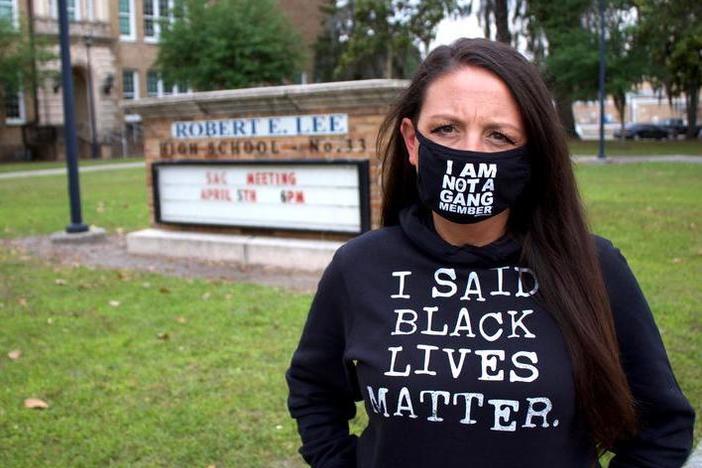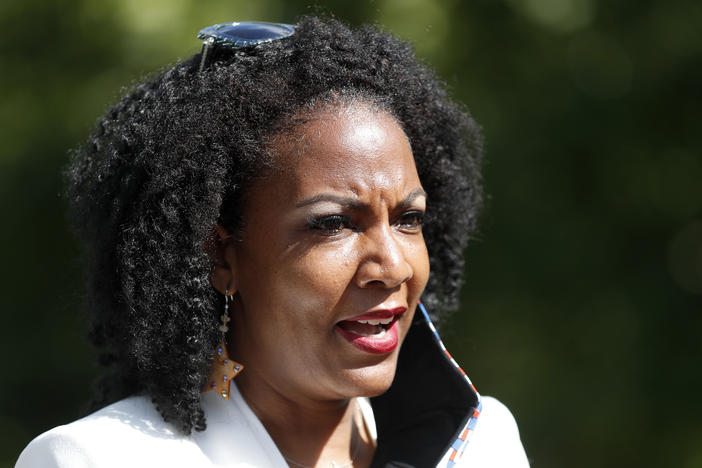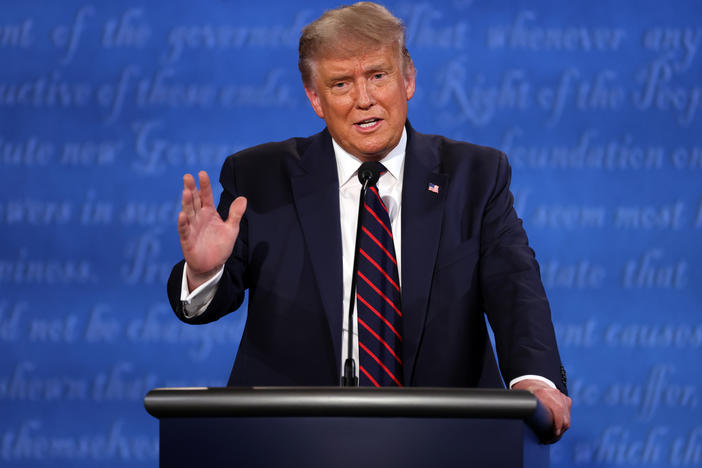Section Branding
Header Content
As Statues Of America's Racist Past Were Removed This Year, So Were Tattoos
Primary Content
2020 saw an unprecedented number of statues and other symbols related to America's racist past removed. People with racist tattoos followed suit, by getting their tattoos covered up.
Transcript
MARY LOUISE KELLY, HOST:
More than a hundred Confederate symbols have been removed from public spaces around the United States since George Floyd was killed. Then, there are symbols of America's past that aren't flags or statues. They're more personal, even inked into skin. Tattoo artists around the country say that as national protests against racism took off this summer, requests to remove or cover up racist tattoos did, too. NPR's Jonaki Mehta has the story.
JONAKI MEHTA, BYLINE: When Kyle Boykin was 17 years old, he got a Confederate flag tattooed on his arm. It was rather large, he says. It covered most of his bicep. And at the time, several of his friends got similar Confederate tattoos.
KYLE BOYKIN: Growing up here in rural Ohio, it's just something that, you know, was regularly there on display.
MEHTA: As Boykin got older, he began to understand that, as a white man, the same flag that represented his family's Southern pride held how dark reminders of slavery and white supremacy for many Black Americans. He was especially wary of it being seen at work. He's a safety supervisor for the transit agency in Zanesville, Ohio, where he's spent his whole life. A few years ago, he got the words heritage, not hate added to the tattoo to clarify his intentions. But then, George Floyd was killed.
BOYKIN: And that was the moment for me, like, wow, you know, this is something that genuinely affects millions of people. And then, you know, just watching it grow from there into the movement that it is now.
MEHTA: The movement even came to Zanesville in the summer.
(SOUNDBITE OF ARCHIVED RECORDING)
UNIDENTIFIED PROTESTERS: Justice now. Justice now.
MEHTA: Boykin says he felt proud to see his town come together. But he was on the edge of his seat, waiting for counter-protesters.
BOYKIN: That didn't happen, which really surprised me, that, you know, they weren't met with any kind of opposition, which, to me, was a clear indicator that times are definitely changing.
MEHTA: Boykin wasn't alone in feeling a final push to get his tattoo covered up. In fact, tattoo artists from different parts of the country told NPR that as statues and flags came down this year, they saw an uptick in cover-up and removal requests. That's what Corey Fleischer told us, too.
(SOUNDBITE OF ARCHIVED RECORDING)
COREY FLEISCHER: What's going on, guys? Erasing Hate coming to you live, about to take out a swastika. I'm dedicating this to George Floyd and everybody...
MEHTA: That's Fleischer in an Instagram video. He founded an online community called Erasing Hate about 10 years ago. It started with him painting over and power-washing hateful graffiti in his hometown, Montreal.
(SOUNDBITE OF POWER WASHER OPERATING)
MEHTA: The Erasing Hate community now does this work around the world. Fleischer gets emotional when he talks about it.
FLEISCHER: I'm 6-foot-2, 260 pounds. You know, I walk around, you know, with a giant gun that can shoot water through a wall. And every time I feel that, I feel like crying.
MEHTA: As the racial justice movement gained traction in May, he started hearing more and more from people who wanted to get their racist tattoos covered up.
FLEISCHER: I would open up my phone every few hours, and it would be somebody else messaging me, hey, I have a Confederate flag. Can you help us erase it?
MEHTA: Fleischer doesn't do the removals himself. He serves as a kind of middleman, connecting them to tattoo artists in his network.
FLEISCHER: I don't care what your backstory is. I'm only looking at what's going on today and what's going on tomorrow. So if you want to erase it, you know, I'm going to be there for you. I'm going to set it up for you, and we're just going to move forward.
(SOUNDBITE OF TATTOO MACHINE OPERATING)
BILLY WHITE: My name is Billy White. I've been tattooing for 16 years here in Ohio, in Zanesville, and my tattoo shop is called Red Rose Tattoo.
MEHTA: Billy White is the cover-up artist Fleischer works most closely with these days. White started doing cover-ups after the 2017 Unite The Right rally in Charlottesville, Va. That day, a self-identified neo-Nazi drove his car into a crowd of peaceful protesters, killing one person and injuring 35.
WHITE: There was a loss of innocent life. The person that drove the car into that crowd was from Ohio. And I knew that I had to kind of change the narrative.
MEHTA: So White began covering up racist tattoos pro bono. But right after he did his first one, he realized he needed a vetting process.
WHITE: I definitely don't want to veil white supremacy in any kind of way. I wanted to make sure that these clients had really moved on from their past lives and their past ideologies.
MEHTA: He started getting to know his clients, some over the course of one or two years, before committing to cover up their ink. This year, he says, more people seem to be having a similar awakening to the one he had a few years ago.
WHITE: If this year didn't wake you up to the atrocities that our brothers and sisters are facing every day, then I don't know what will.
MEHTA: Many of his clients come from out of state. They range from people formerly in white supremacist groups to individuals who were forced to get tattoos when they were incarcerated. Others are like Kyle Boykin, who said they'd made a mistake. He went in for his cover-up shortly after protests in Zanesville began.
BOYKIN: Once that got covered up, it was the relief of a community taking down a statue, you know, and moving forward. And getting that covered up was a personal growth moving forward for myself.
MEHTA: What was once a Confederate flag is now a fierce-looking bald eagle perched on a log. Where the words not hate were once inscribed, there are now colorful flowers.
Jonaki Mehta, NPR News.
(SOUNDBITE OF N.H.P DASH SONG, "TBP") Transcript provided by NPR, Copyright NPR.
Bottom Content



